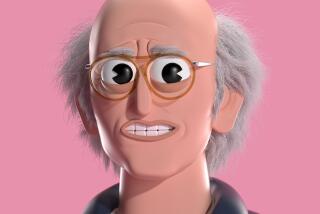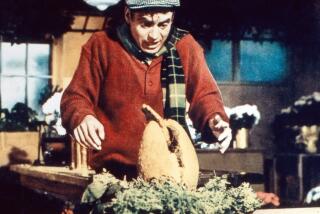Larry Cohen, B-movie director of 1970s cult horror films, dies at 77
- Share via
Larry Cohen, the maverick B-movie director of cult horror films such as “It’s Alive” and “God Told Me To,” has died. He was 77.
Cohen’s friend and spokesman, the actor Shade Rupe, said Cohen died Saturday at his home in Beverly Hills. He had been battling cancer, said publicist Jeff Sanderson.
For the record:
9:55 a.m. March 26, 2019This article states that Cohen was 77 when he died and that he was born July 15, 1941. He was 82 and was born July 15, 1936.
Cohen’s films were schlocky, low-budget works that developed cult followings, spawned sequels and gained esteem for their genre reflections of contemporary issues. His 1974 film “It’s Alive,” about a murderous mutant baby, dealt with the treatment of children. His New York-set 1976 satire “God Told Me To” depicted a series of shootings and murders carried out in religious fervor. Andy Kaufman played a policeman who goes on a shooting rampage during a St. Patrick’s Day parade. There were also aliens.
In the 1985 film “The Stuff,” Cohen skewered consumerism with a story inspired by the rise of junk food. It’s about a sweet yogurt-like substance that’s found oozing out of the ground and is then bottled and marketed like an ice cream alternative without the calories. The “stuff” turns out to be a parasite that turns those who consume it into zombies.
“It wasn’t just going to a studio like a factory laborer and making pictures and going home every night,” Cohen told the Ringer last year. “We were out there in the jungle making these movies, improvising, and having fun, and creating movies from out of thin air without much money.”
“You’ve gotta make the picture your way and no other way,” he added, “because it can’t be made otherwise.”
Cohen’s approach — he would often shoot extreme scenes on New York City streets without permits or alerting people in the area — made him, like Roger Corman, revered among subsequent generations of independent genre-movie filmmakers. A documentary released last year, “King Cohen: The Wild World of Filmmaker Larry Cohen,” paid tribute to him.
“Larry Cohen truly was an independent freewheeling movie legend,” the writer-director Edgar Wright (“Shaun of the Dead,” “Baby Driver”) said on Sunday, praising him “for so many fun, high-concept genre romps with ideas bigger than the budgets.”
Born July 15, 1941, Cohen grew up in New York City and by the time he was 8 was writing and drawing his own comic books, which later served as storyboards for his early film work. He began in television, where he wrote episodes for series like “The Fugitive,” “The Defenders” and “Surfside 6.” New York would be the setting for many of Cohen’s films, including 1982’s “Q,” in which a giant flying lizard nests atop the Chrysler Building.
Cohen’s 1973 blaxploitation crime drama “Black Caesar,” scored by James Brown, was about a Harlem gangster. He and star Fred Williamson reunited the next year for “Hell Up in Harlem.”
He later directed Bette Davis’ last film, “Wicked Stepmother,” in 1989. More recently, he wrote the 2002 Colin Farrell thriller “Phone Booth” and 2004’s “Cellular,” with Chris Evans.
Cohen was often his own producer, director, writer and sometimes prop-maker and production manager. “Otherwise,” he told the Village Voice, “I’d have to sit down with producers, and producers are a real pain in the ass, believe me.”
He is survived by his wife Cynthia Costas Cohen; children Melissa Cohen and Jill Gatsby from an earlier marriage to Janelle Webb; stepchildren Bobby Goforth, Pam Wagner and Louie Goforth, grandchildren Alexis and Gabriel and step-grandchildren Matt, Jason, Michelle, Lindsay and Laura. He was the brother of the late Ronni Chasen, the Hollywood publicist who was fatally shot in a botched robbery in 2010.
A Times staff writer contributed to this report.
More to Read
Only good movies
Get the Indie Focus newsletter, Mark Olsen's weekly guide to the world of cinema.
You may occasionally receive promotional content from the Los Angeles Times.










